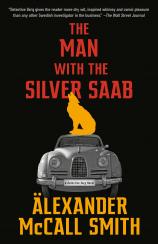Reading Group Guide
Discussion Questions
The Man with the Silver Saab: A Detective Varg Novel

1. Detective Varg is often lost in his own reflections. Are you a philosopher at heart? Do you often contemplate the nature of man, beast and the world? What types of things do you consider in your reveries?
2. “Human perversity [is] endlessly inventive.” What does Varg mean by that? How does his job as an inspector in the Department of Sensitive Crimes unit help him form that opinion? Do you agree?
3. What do you think of Varg’s neighbor, Mrs. Högfors? Does she remind you of any of Alexander McCall Smith’s other characters?
4. Varg admits to himself that he is in love with his colleague Anna but would do nothing to interfere with her life with her family. “How sad,” he thinks. “We had such a short time in this world, this little speck in infinite space, our wobbly little platform, and how wretched were we if we would so love to spend it with one who was unprepared to spend it with us; who would not, or could not --- it amounted to the same thing, to the same existential bad luck.” Do you agree with this sentiment? How does it change your perception of Varg, if at all?
5. Varg reflects: “One could not be held accountable for one’s dreams, but they revealed one’s inmost wishes; they laid out exactly what one really wanted to do. And what one really wanted to do constituted, in a sense, one’s deepest self, for which, surely, we were all responsible --- at least to some degree. Or were we? Could we make our character better than it was?” How well does this thought echo Varg’s character? Do you think we can change our inner nature?
6. Detective Varg’s neighbor, Mrs. Högfors, cares deeply for Martin (the dog) and, by proxy, his owner. Why is she anxious when he finds her nephew’s air rifle? What is she hiding?
7. Why do the police come and take Varg’s Saab away, and why was he suspended? What did you think of his conversation with Inspector Lund and the resolution of the suspension?
8. Anders Kindren comes to Varg with a list of suspicious incidences that seem to be escalating. It appears someone is trying to hurt Kindren, not physically, but damaging his reputation in various ways. Why is this a good case for the Department of Sensitive Crimes, and Varg in particular?
9. When Varg goes to the auction house to investigate the mistaken painting, he meets Christina Berk and her intern, Ivar. How do those two characters relate to each other outside of work? Why does Ivar tell Varg as much as he does about his personal life?
10. Varg gets indirectly (and unofficially) involved in a case with a man threatening people with cucumbers. Besides the incident with Mrs. Högfors, how does this connect to Varg’s politician brother, Björn?
11. Varg has an interesting time at Kindren’s party. Who do you think he has the most impactful conversation with? Is Varg suspicious of any of the guests? Would you be?
12. How would you describe Blomquist? Is he useful to Varg? Why does Varg let him stay in the department? Do you think it’s the right thing for Blomquist? What about the department as a whole?
13. In the end, three people were responsible for Anders Kindren’s troubles. Who are they, and why did they participate in such an endeavor? How does love for another person play into their actions?
14. Varg meets a new romantic interest, his veterinarian’s assistant, Juni. What about her does he like? What does Varg confess to Mrs. Högfors about his feelings? How are his feelings about Anna resolved? Have you been in a situation where you liked a colleague as more than a friend? What did you do about it?
15. Consider the closing line of the book: “[T]here is a certain nobility in statements that are both kind and true.” How does this fit into Varg’s character? Is he king? True? How is he noble?
16. THE MAN WITH THE SILVER SAAB (referenced on page 170): Why is this title appropriate for the book? What does the car say about its owner?
17. This is the third book in the Detective Varg series. What do you enjoy about this series? How is it different from Alexander McCall Smith’s other series?
18. Given that Alexander McCall Smith is learned in bioethics, we can infer that he, as the characters he writes, searches for truth in an otherwise unethical situation. If you were to meet the author, what would you like to discuss with him?







